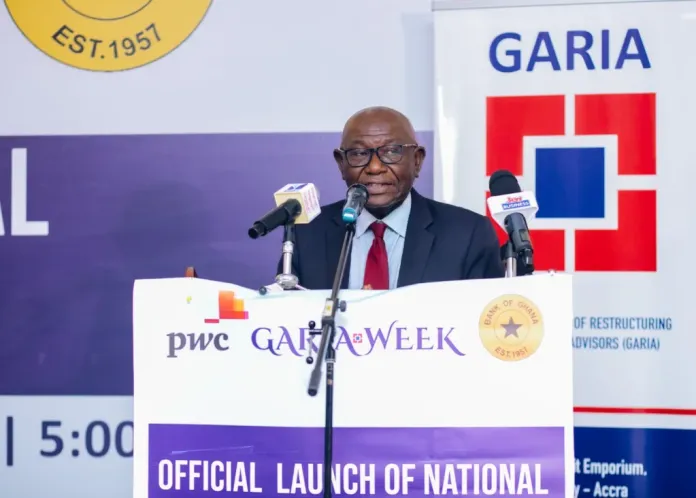- pending passage of Charter bill by parliament
The Ghana Association of Restructuring and Insolvency Advisors (GARIA) has introduced a bill aimed at establishing a Chartered Institute of Insolvency Practitioners and Restructuring. The move is a bid to extend support to struggling businesses and create an enabling environment for corporate recovery.
This bill, which awaits passage in parliament, is not only designed to aid private companies but also provide assistance to distressed state-owned enterprises (SOEs).
Felix Addo, president of GARIA, explained the objective behind this bill, highlighting the need to bolster businesses – making them “fit for purpose”; and emphasised the importance of seizing opportunities for the benefit of shareholders and stakeholders.
“Businesses, particularly those in distress, can rely on the insolvency framework that GARIA has worked diligently to establish. This is a critical step toward salvaging businesses and ensuring they can be saved,” Mr. Addo stated during a two-day GARIA Business Rescue Seminar, which is part of GARIA Week 2023.
The recently enacted Corporate Restructuring and Insolvency Act 2020 (Act 1015) represents a significant shift in how insolvency and liquidation proceedings are handled in the country. It introduces a ‘rescue culture’, enabling companies to restructure or reorganise instead of opting for administration.
This change opens up the possibility of restructuring, receivership or administration for all registered companies in the country, shifting from a practice that was mainly reserved for specialised institutions such as banks and insurance companies.
Act 1015, in conjunction with the Companies Act 2019 (Act 992), is a response to challenges posed by the COVID-19 pandemic – which severely impacted the economy and left numerous businesses struggling to survive. The goal is to protect businesses from collapse and, consequently, safeguard the interests of creditors and shareholders.
Before 2020, insolvency proceedings in Ghana were governed by Act 180 and the Companies Act 1963 (Act 179), with Act 180 focusing primarily on the involuntary winding-up process triggered by a company’s inability to pay its debts. The absence of rescue remedies in the previous legislation, particularly during the pandemic, exposed inadequacies of the legal and regulatory framework governing corporate insolvency.
Adelaide Benneh Prempeh, a key member of GARIA and Managing Partner of B&P Associates, further underscored the insolvency framework’s importance. She stressed that struggling businesses should be aware of the support available through this framework, and encouraged them to seek assistance.
She also highlighted the role of insolvency practitioners in helping distressed companies find both short- and long-term solutions.
“Challenges arise in identifying struggling businesses, as they often hesitate due to concerns about reputation and fallout. Many businesses may not even realise they are in distress,” Ms. Benneh Prempeh said – underlining the importance of identifying elements in the legal framework that position businesses for assistance.
The GARIA Business Rescue Seminar, an essential component of GARIA Week 2023, is dedicated to addressing the issues of restructuring and rescue culture in response to the recent economic challenges. The seminar, themed ‘Leveraging restructuring and business rescue for corporate renewal: turning crisis into opportunity and growth’, brings together expert speakers to provide practical advice and solutions.
Key topics covered during the seminar included insolvency and restructuring strategies, financial restructuring, governance, leadership and transformational change. It encouraged businesses to conduct diagnostics of their operations, understand the global and local environmental impact, and align their objectives for long-term sustainability.










